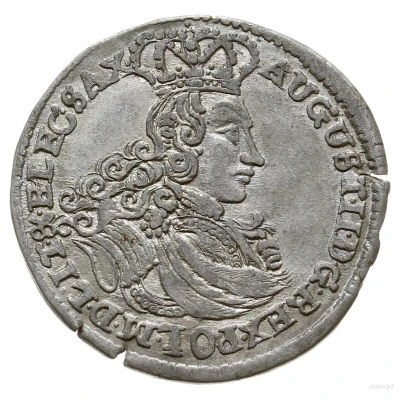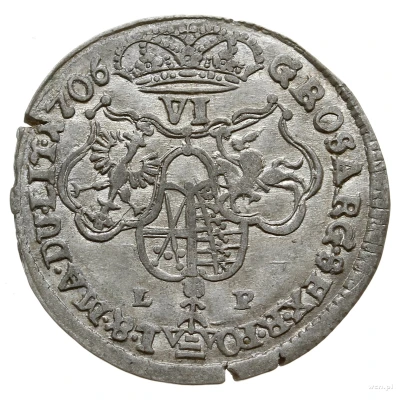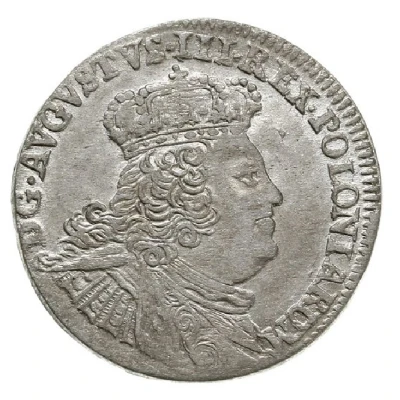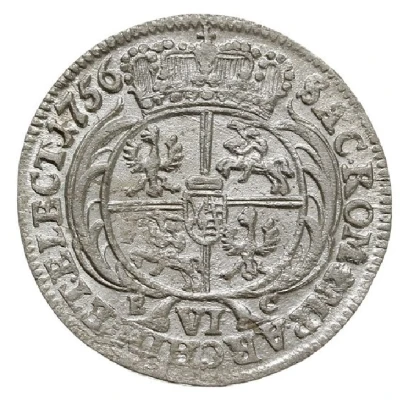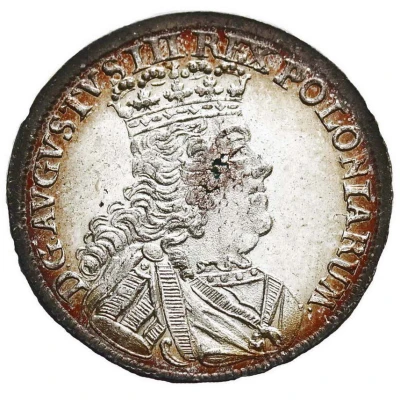


Szóstak koronny - August III Lipsk; early bust
| Billon (.288 silver) | 3.32 g | 25 mm |
| Issuer | Polish–Lithuanian Commonwealth |
|---|---|
| King | Augustus III (1734-1763) |
| Type | Standard circulation coin |
| Years | 1753-1754 |
| Value | 6 Groschens (Szóstak) (⅕) |
| Currency | First Zloty (1573-1795) |
| Composition | Billon (.288 silver) |
| Weight | 3.32 g |
| Diameter | 25 mm |
| Shape | Round |
| Technique | Milled |
| Demonetized | Yes |
| Updated | 2024-10-07 |
| Numista | N#122661 |
|---|---|
| Rarity index | 91% |
Reverse
Crowned Poland-Lithuania arms in oval, Saxony estucheon in center, surrounded by sprigs. Value below in Roman numerals
Script: Latin
Lettering:
SAC. ROM. IMP. ARCHIM.ET ELECT.1754.
E-C
VI
Unabridged legend: Sacri Romani Imperii Arch ... et Elector
Translation:
Elector and Arch ... of the Holy Roman Empire
6 Groschen
Comment
Mint: Lipsk - Leipzig - لايبزيغ - Lipsko - Lipsia - ライプツィヒ - Лейпциг - Lipsia - 莱比锡
Kopicki 2098 - Sz in value location reverse, no initials EC
© Gabinet Numizmatyczny D. Marciniak
Kopicki 2099 - As in main photos, VI and initials EC
© Gabinet Numizmatyczny D. Marciniak
Kopicki 2100a / Kopicki 2100b
Punch 1:
D G AVGVSTVS III REX POLONIARUM
SAC ROM IMP ARCHIM ET ELECT 1754
Price: 3 300 PLN
Picture: © ANMN
Punch 2 (bust of 1753):
D G AVGVSTVS III REX POLONIARUM
SAC ROM IMP ARCHIM ET ELECT 1754
Price: 6 000 PLN
Picture: © ANMN
Interesting fact
One interesting fact about the Szóstak koronny - August III (Lipsk; early bust) coin is that it was minted during a time of great economic and political change in the Polish-Lithuanian Commonwealth. The coin was issued in 1753-1754, a period of increased trade and commerce, and its Billon composition (containing 28.8% silver) reflects the growing influence of Western European economic systems on the region. Additionally, the coin's design, featuring an early bust of August III, represents a shift towards more modern coinage designs, moving away from the traditional medieval styles that were prevalent in the region at the time.


